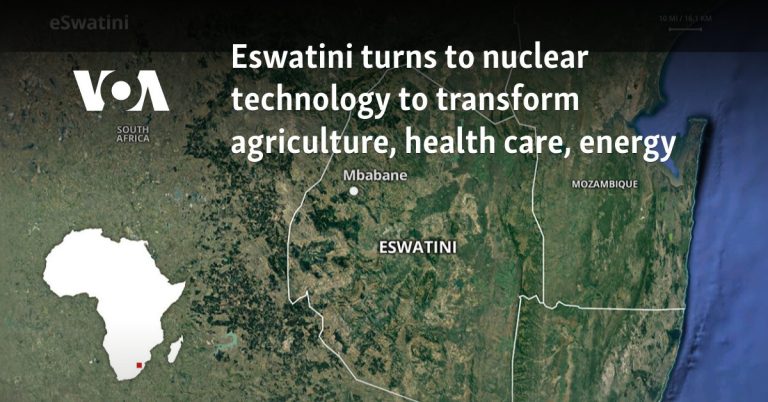Manzini, Eswatini —
Eswatini has launched an initiative to harness the power of nuclear technology to achieve sustainable development in areas such as agriculture, health and energy planning, developed with the support of the International Atomic Energy Agency.
The Country Programme Framework (CPF), announced two weeks ago by Eswatini's Minister of Natural Resources and Energy, Prince Ronkokela, aims to harness nuclear technology for socio-economic development, with key focus areas being energy security, food security and human health, in line with Eswatini's National Development Plan and the United Nations Sustainable Development Cooperation Framework.
Bongekile Matsenja, a chemical engineer and engineering manager at Eswatini National Oil Company, believes Eswatini’s partnership with the International Atomic Energy Agency (IAEA) will enable the country to make informed decisions about its energy future.
“Access to clean, affordable, safe and reliable energy is a key element for the country's sustainable development,” he said. “We believe that this partnership will support Eswatini in making educated decisions about its energy supply options with the help of the energy plan, enabling the country to autonomously plan for the country's energy future.”
Sonia Paiva, a sustainable agriculture expert and nuclear technology advocate who served as a panelist at the COP28 UN Climate Change Conference, believes the timing is right for Eswatini to turn its attention to nuclear technology, as the country has already established a policy on the topic and is now working towards implementation.
“The whole world is trying to figure out how to make the planet a better place to live,” she said.
Physician Dr Mduduzi Mbuyisa believes that in addition to potential benefits in agriculture and energy, the technology has great potential to improve Eswatini's health system.
“Nuclear medicine has the potential to ensure diagnostic capabilities, and by using machines called PET and SPECT, it can help us take clearer images and do advanced imaging, which can help improve healthcare and the healthcare system overall,” he said. It will also help develop new skills and open up new career opportunities.
Eswatini's foray into nuclear technology is part of a larger trend among African countries to harness the benefits of the technology. With growing energy demands and concerns about climate change, nuclear energy is increasingly being seen as a potential solution.

